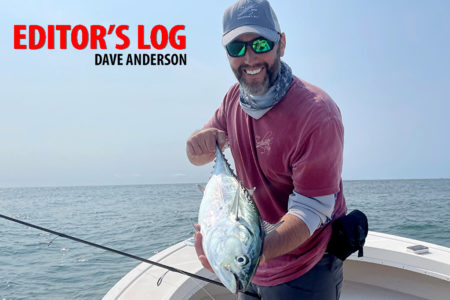“There is no recreational fishery for sandbar sharks. If a fisherman catches one unintentionally, they must release it immediately, with minimal injury, and without removing it from the water.” That’s how NOAA Fisheries describes the sandbar (brown) shark in their online species overview, the operative word here being “unintentionally” which of course means anglers are not allowed to “intentionally” target a brown shark – that would be a “directed” fishery where an angler is directing attention towards a specific species.
So imagine my confusion on May 8th when I opened an email alert (Fishery Bulletin 122) from NOAA Fisheries and their Office of Science & Technology showcasing research about the high survivorship of sandbar sharks in a growing land-based ‘catch and release’ fishery in Massachusetts. Compiled by researchers from the New England Aquarium, University of Massachusetts, and Harvard University, the study noted, quote, “Directed land-based recreational catch-and-release fishing for sandbar sharks (carcharhinus plumbeus) is growing in popularity in Massachusetts.”
Suffice to say, that opening line above in italics, used by researchers and promoted by NOAA Fisheries, left me scratching my head. How could Massachusetts allow a “directed land-based” recreational fishery for brown sharks to grow in popularity when sandbars, like sand tigers, are a prohibited species? So I contacted NOAA Fisheries to see if “directed land-based recreational catch-and-release fishing for sandbar sharks” was indeed an allowable activity; the response back from Karyl Brewster-Geisz, branch chief of rulemaking within NOAA’s Highly Migratory Species Management Division, only left me scratching my noggin even harder.
“The regulations are different in every state. I do not know if Massachusetts allows anglers to target prohibited species,” said Brewster-Geisz. She did confirm that anglers fishing in federal waters outside of 3 miles “are not allowed to target prohibited shark species (with the exception of white sharks),” but she basically took state officials off the hook by saying “Individual states manage the shark fisheries within state waters. Most states along the east coast and Gulf of Mexico mirror the federal regulations for sandbar.”
In other words, they don’t have to, but they do anyway! In seeking answers from the New Jersey Department of Environmental Protection (NJDEP), it’s still not exactly crystal clear. “New Jersey does not allow targeting of prohibited species, and fishing for sharks is regulated by both state and federal regulations,” said NJDEP Press Officer Vincent Grassi, explaining how “federal and state regulations prohibit targeting any prohibited species and anglers must release any prohibited shark immediately.” The NJDEP seems convinced that federal regulations prohibit a directed ‘catch and release’ sandbar shark fishery in the surf, yet the federal rule makers have kicked the letter of the law back down to the states.
As a New England buddy explained, Massachusetts may prohibit anglers from harvesting sandbar sharks, but there’s no state law against targeting them. And from the looks of this new research, there really shouldn’t be either. “The results of this study provide strong evidence that land-based catch-and-release fishing for sandbar sharks in Massachusetts is a sustainable practice when state regulations and best-practice guidelines are followed,” the researchers noted.
Maybe the right thing to do here is to open up discussion on allowing for a directed catch and release shark fishery in the Garden State, especially since both the science and NOAA Fisheries have apparently given the green light to do so. Hey, it works in Massachusetts, right?
In the interim, New Jersey surfcasters who “unintentionally” hook a sandbar or sand tiger shark should limit interactions on the sand while unhooking the fish, keeping it in the water or along the waterline, and no pics while smiling at the camera holding the mouth open. As Grassi noted, “Posing with a prohibited species that has been dragged onto the beach and not released immediately from the water is a violation of the law.” That much still seems clear.


